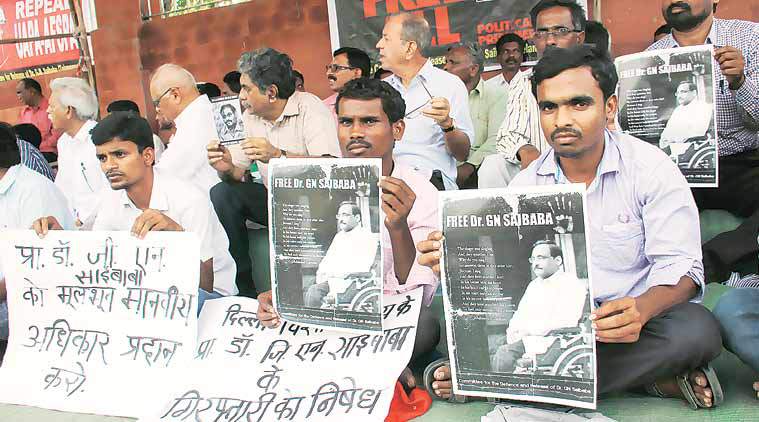[The writer Mannish Sethi relates the court order to the arbitrary and malevolent character of law in India today. — Frontlines ed.]
Blind to justice
Why the December 23 order of the Nagpur bench of the Bombay High Court — refusing Professor Saibaba bail and issuing a notice of contempt to Arundhati Roy — takes one’s breath away.

Social activists staged a protest in Nagpur Thursday, demanding Saibaba’s release on bail. (Source: Express Photo)
Law is no stranger to prejudice or moral anxieties. Judicial pronouncements can sometimes cast aside constitutional values and defer to societal biases masquerading as righteousness. The recurrence of “collective conscience” in terror cases, where the threat of terrorism looms so large that it can overshadow the lack of evidence, is only too well known. Even so, the December 23 order of the Nagpur bench of the Bombay High Court takes one’s breath away. It rejected the regular bail plea moved by the lawyers of Delhi University professor, Saibaba, cancelled his interim bail which allowed him to receive treatment till December 31, and ordered him to surrender within 48 hours. Besides, the court issued a notice of criminal contempt to Arundhati Roy for her article, ‘Professor, POW’, published in Outlook magazine. The order will be remembered for its naked display of contempt for civil rights, partisanship and renunciation of judicial independence.

Wheelchair bound, Saibaba spent over a year in jail before the division bench of the Bombay High Court granted him interim bail on the plea of a social activist in June 2015. (Illustration by C R Sasikumar)





by Manisha Sethi | The Indian Express | December 30, 2015